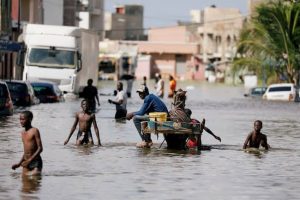By Ben Eguzozie
-
Environmental damage increases
-
Continent must increase spending by billions to combat climate change
-
Citizens want renewable energy investment prioritised
With the world still far from meeting the objectives of the 26th edition of conference of parties (COP 26) of the UN climate conference, to limit global warming to 1.5°C on or before 2050, millions of Africans, whose continent is the least emitter of carbon, are already experiencing the wave of the worst effects of the global climate change menace. These are the people’s everyday life, and their incomes or sources of their livelihoods, a new survey by the European Investment Bank (EIB) has shown.
The first African edition of the EIB 2022 Climate Survey aims to inform the broader debate on attitudes and expectations in terms of climate action.
Last month, leaders of national governments across the world gathered at Egypt’s Sharm El Sheik for the COP 27, but it emerged that the road to 1.5°C is yet to be trodden, whereas climate change is dealing ruthlessly with Africa – now seen as the world’s whipping continent – though it is the least polluter.
In November, the Energy Transitions Commission (ETC) warned that the world was still far from meeting the COP 26 objectives. The ETC report titled, “Degree of Urgency: Accelerating Action to Keep 1.5°C on the Table highlights”, advised that only national actionable commitments could set the world on 1.5oC.
It further said that the just-concluded COP 27 must “act as a catalyst to turn broad national commitments into specific actions, and pave the way to more forceful measures to phase-out coal and end deforestation”.
The EIB Africa-specific climate change survey indicated that 88 percent of African respondents believe that climate change was already affecting their everyday life. Another 61 percent of respondents believe that climate change and environmental damage have affected their income or source of livelihood.
Additionally, 76 percent of the respondents, mainly Africans, said renewable energy should be prioritised.

The results of the survey come at a critical moment for Africa, after COP 27 where the mobilisation of resources for the mitigation of global warming and the adaptation to its effects were at the heart of the debates with the decisive agreement reached on a new “loss and damage” fund for vulnerable countries hard-hit by climatic disasters.
According to Ambroise Fayolle, EIB’s vice-president, “a great majority of respondents in the countries polled in Africa are alerting us that climate change is already impacting their families and sources of income”.
The results of the EIB 2022 Climate Survey also show that developing renewable energy is seen as an important priority by most of the respondents.
In order to combat climate change, Africa needs to increase its spending by several hundred billion euros a year, the EIB noted.
The European multilateral lender has been supporting clean energy investments in Africa, such as wind power, hydropower and off-grid solutions, for many years. With a 55-year history of African presence, it has invested €59 billion in 52 African countries, supporting infrastructure projects, innovative firms and renewable energy schemes, in the public sector and private companies, from microenterprises to the largest multinationals.
Acknowledging that Africa was the part of the world most affected by climate change, although it contributes least to the problem, EIB noted that the continent faces an increased threat from extreme weather events and chronic climate change, which influence agricultural yields, food and water security, ecosystems, livelihoods, health, infrastructure and migration. By damaging vital resources and increasing competition for natural resources, climate change is likely to increase poverty, inequality and unemployment.








